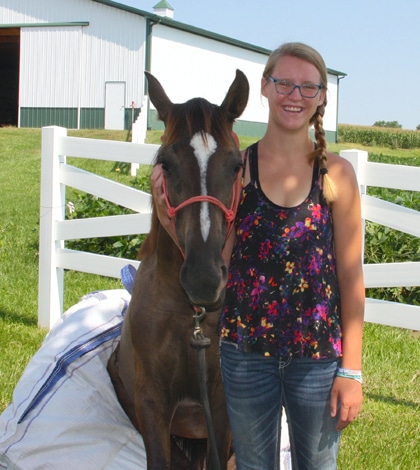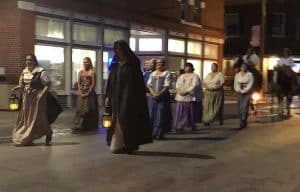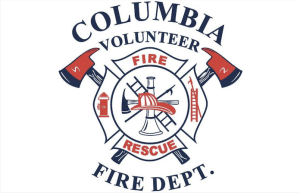Local family comes to the rescue of wild horses

Bailey Lambeck’s rescued horse Cheyenne shows off one of her tricks by sitting while Lambeck gives her encouragement. (James “Tal” Moss photo)
Connie Lambeck had a history with horses, but it was not a totally positive one.
“When I was little my dad had horses but I was scared of them,” she remembered. “I couldn’t ride them. I could pet them, but that’s it. I loved horses but I was just scared of them.”
Years later, Connie and her family went horseback riding with their neighbors and fell in love.
Now, the Waterloo woman has overcome her fear of horses and is helping them overcome their fear of humans by rescuing and rehabilitating wild and abused or neglected horses.
The Lambecks began this undertaking after they met a woman at the Illinois Horse Fair who rescues wild horses through the Bureau of Land Management Wild Horse and Burro program.
As part of its duties, the BLM protects and manages herds of wild horses and burros across 10 western states. To help control the population size, the BLM will remove excess animals and place them into private care.
Since the program’s inception in 1971, it has placed more than 240,000 wild horses and burros into private care.
When the family heard about this program, Connie, her husband Mike and their daughter Bailey quickly became intrigued, especially after seeing wild horses at a Kentucky park.
“We really got into it last year when we went and watched one of them,” Bailey said. “I was like ‘I want to do this.’ So then we started adopting a bunch of them.”
Currently, the family has 13 horses in its herd. Eight of those horses are wild, with 10 being rescues from the wild or from previous owners who abused or neglected them.
The wild horses come from Utah, Wyoming and Nevada. It costs $125 to adopt each wild horse.
“It was more like a rescue mission,” Bailey said of the family’s efforts. “I wanted to start rescuing them and it looked really fun. I wanted to get them out of somewhere where they didn’t have enough to eat or enough water supply and give them a good home.”
Connie also said rescuing the horses provides a fun challenge for the family, who only recently began owning horses.
“It was a chance to test our ability,” said Connie, who works at Waterloo High School. “2011 was the first time we owned a horse. We kind of wanted to see if we could take one who hadn’t been touched by humans and train it.”
The family has done just that, training their horses to compete in competitions.
One of the main ways the family has used the wild horses is in the Extreme Mustang Makeover competition. For this event, trainers have 120 days from when they get their wild horse to tame it.
At the event, trainers show that their horse can do basic things like trot and back up. Horses also demonstrate trail skills like walking through gates or over poles before having a chance to showcase any advanced skills their trainers have taught them in a freestyle section.
The family also competes in various other competitions, including the Monroe County Fair.
The Lambeck family adopted their first wild horse, Cheyenne, on Feb. 23. In that time, Cheyenne has become completely tame, capable of performing numerous tricks by responding to voice commands.
By contrast, the family’s five new wild horses are so skittish they will not even let themselves be touched.
The family trains the horses using individualized, compassionate methods that rely on patience instead of a whip.
“We do what’s best for the horse,” Bailey said. “We don’t use the same training techniques for a wild mustang versus a domestic horse or even a wild mustang versus another wild mustang. They’re totally different animals with totally different mindsets. They’re like kids. It really depends on the horse for what will work.”
“Some people will rope them and try to manhandle them,” Connie added. “We do it this way where we leave it up to them and do it at the animal’s pace.”
Bailey said the amount of time it takes to train a horse varies based on its background.
“Wild ones honestly seem to be a lot more trusting,” she noted. “Once you get them to trust that you’re not going to hurt them, they’ll do anything and everything you ask. Usually with a domesticated horse, especially one that’s been abused, it takes so much longer to get them out of that and then you have to restart the training.”
Connie said the whole endeavor would not be possible if not for her husband and father, Carl Braun. Braun owns a cattle farm the family is converting for horses.
Because of those resources, the family can continue the painstaking process, which Bailey said is worth their efforts.
“It’s worth it just to give a horse another chance or a chance to begin with,” she said. “There are so many horses out in the wild today that have no food or no water. It’s just to give them a home. That way they don’t have to go to a sanctuary without having that connection with somebody. For abused horses, it’s just giving them another chance and gives them a loving home to show them the world isn’t bad.”
Connie said the family may eventually use their horses to help rehabilitate others through equine-assisted therapy. Currently, the family and their horses can be seen at such local events as the Waterloo Optimist Club Bull Ride, offering free rides to children.






